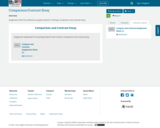
Assignment sheet for professors to guide students in writing a comparison and contrast essay.
- Subject:
- Composition and Rhetoric
- Material Type:
- Homework/Assignment
- Author:
- Ann Smith
- Date Added:
- 01/21/2022

Assignment sheet for professors to guide students in writing a comparison and contrast essay.

This resource contains activity handouts, a rubric, a facilitation guide, and tex files. The material is meant to be used for those teaching a college algebra course. The activities are meant to provide a deeper understanding (than a traditional course offers) of some of the topics covered in a college algebra course. The activities are intended for group activities and options exist for use in a single class or multiple classes.
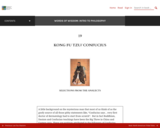
This reading includes selections from Confucius' Analects and a description of some of his key values.
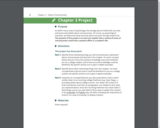
As within many areas of psychology, the average person holds both accurate and inaccurate beliefs about consciousness. Of course, as psychological scientists, we determine what we know about any topic through empiricism. The purpose of this project is to have you explain how a variety of areas of consciousness could have a positive effect in a student’s life.
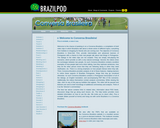
A compilation of video scenarios of people interacting with each other in Portuguese. Conversations include dialogs, questions, turn taking exchanges, clarifications, false starts, hugs, laughter, asides. The scenarios are enhanced by transcriptions, translations, content analysis, and notes and discussion blogs.
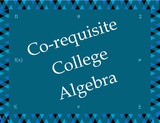
This resource includes online homework and quizzes, lecture notes for instructors (some with guided note packets or student versions), sample syllabi, sample schedules, and sample exams used in a corequisite College Algebra course, where students are enrolled in both Intermediate and College Algebra simultaneously. All of the resources can be used for a stand alone College Algebra course, with minor editing.

Students examine the anthropological perspective of human culture, including such institutions as kinship, politics, and religion, and evaluate the interrelationship between culture, environment and biology. Students explore the effects of globalization on culture while developing critical thinking skills through the application of essential anthropological approaches, theories, and methods.Login: guest_oclPassword: ocl
![DIDLS Understanding Tone in Literature [Assignment]](https://img.oercommons.org/160x134/thecb-production/media/screenshots/c13ef7f80f32c72ff0940ff96f5e41e666563e20155794a80c99b5300a4a042a.png)
Upon successful completion of this assignment, students will
- analyze the tone of a given text by evaluating its diction, imagery, details, language, and structure through the DIDLS strategy
Author: Lenora Perry-Samaniego
Editor: Mary Landry, C. Anneke Snyder
Supervisor: Terri Pantuso
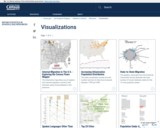
This resource from the U.S. Census Bureau provides examples of Visualizations that can be utilized to discuss the various elements of statistics: Data Collection, Data Representation, Data Analysis, and Data Interpretation.
![Definition Essay [Assignment/Rubric]](https://img.oercommons.org/160x134/thecb-production/media/upload/materials/images/Screen_Shot_2024-05-28_at_5.43.54_PM.png)
Upon successful completion of this assignment, students will
- analyze a chosen concept through various strategies, such as its connotations, denotations, and more.
- create a well-organized essay that explains and defends a proposed definition for their chosen concept through reasoning strategies, evidence, and credible sources.
Author: Kimberly Stelly
Editor: Mary Landry, C. Anneke Snyder
Supervisor: Terri Pantuso
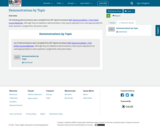
The following demonstrations were compiled from MIT OpenCourseware (MIT OpenCourseWare | Free Online Course Materials). Although they are labeled as demonstrations, they may be adjusted to be used appropriately for exam questions, assignments, discussion topics.

This worksheet is designed to help students develop the ability to identify unclear pronoun usage in their own writing. To achieve this ability, students are shown examples of demonstrative determiners and unclear antecedents as well as strategies to help them avoid these mistakes in their own work. This worksheet is designed to supplement previously generated lessons rather than as a stand-alone lesson.

Derivatives of Inverse Functions (Openstax Homework).
![Description Essay [Assignment/Rubric]](https://img.oercommons.org/160x134/thecb-production/media/upload/materials/images/Screen_Shot_2024-05-28_at_5.30.47_PM.png)
Upon successful completion of this assignment, students will
- create a well-organized essay that describes in vivid detail a significant person, place, event, moment, or object that has impacted their life or perspective.
- evaluate the effectiveness of their drafting by seeking feedback from peers and revising to improve clarity, organization, and impact.
Author: Kimberly Stelly
Editor: Mary Landry, C. Anneke Snyder
Supervisor: Terri Pantuso

A multimedia 1st-year German language program based on videos of native speakers and the UT Summer Program in Wrzburg, Germany. The online textbook includes recorded vocabulary, phonetics lessons, an online grammar component, online comparative polls and internet writing activities.
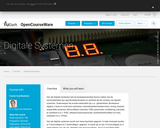
Het vak Digitale Systemen laat de eerstejaarsstudent kennis maken met de verscheidenheid aan specificatietechnieken en synthese bij het ontwerp van digitale systemen. Onderwerpen die worden behandeld zijn o.a.: getalstelsels, Booleaanse algebra, 2-level en multi-level netwerken, minimalisatietechnieken/tools, timing, hazards; sequentiële systemen, Moore/Mealy machines, FSM; specificatie, modellering, simulatie en synthese m.b.v. VHDL; datapad besturingsmodel, synthesemethodieken en tools, realisatie m.b.v. FPGAs.
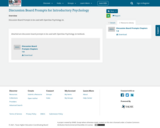
Discussion Board Prompts to be used with OpenStax Psychology 2e.
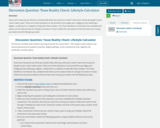
How much money do you think you should make when you start your career? How much money do people in your career make a year? These are honest questions to ask yourself as you begin your college journey obtaining a degree. Luckily there is a website to help with these answers. The Texas Workforce Commission has a website that shows current salary trends for all types of careers in Texas. Follow the instructions to find out how much money you need to live the lifestyle you want.
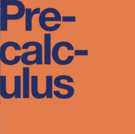
This OER is a list of Discussion Questions for a PreCalculus course using the OpenStax PreCalculus Textbook. There are eight discussion questions included in the Word document which has the equations better formatted.

This assignment asks students to take bibliographic data and generate a properly formatted APA citation. After completing questions #1-8, they are then asked to create 3 properly formatted in-text citations in APA style. Finally, they are asked to take the first 8 citations and turn them into a properly formatted reference sheet, attached to the end of the worksheet. Depending on skill level, the instructor may choose to allow them to use an aid (like Purdue Owl) to construct the citations or do them from memory. This assignment is best used to assess students’ understanding of APA and provide them with low-stakes practice of these formatting skills.